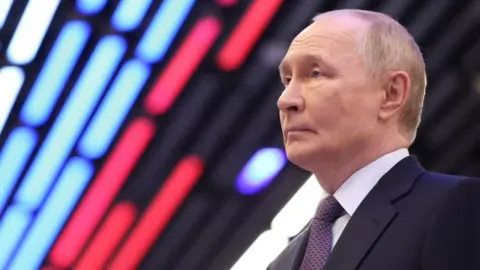Sometimes it's not what's said that makes the biggest impression. It's the reaction. In the Russian Far East, Vladimir Putin delivered a warning to the West: don't even think about sending soldiers - and that includes peacekeepers - to Ukraine. If some troops appear there, the Russian president said, especially now while the fighting's going on, we proceed from the premise that these will be legitimate targets for destruction. The audience at the economic forum in Vladivostok burst into applause, welcoming the threat to 'destroy' Western troops. Observing the scene in the hall, it was chilling.
This strong rhetoric emanated just after Kyiv's allies, termed the Coalition of the Willing, pledged a post-war 'reassurance force' for Ukraine. Putin's later remarks about potentially meeting Ukraine's President Volodymyr Zelensky in Moscow also raised eyebrows, being dismissed outside Russia as unserious political trolling.
Putin's unwavering position encapsulates the Kremlin's message: 'Yes, we want peace, but only on our terms.' The factors fueling his stance seem both military and diplomatic, as Russian forces appear to retain battlefield initiative and Putin garners support from nations like China and India during international meetings.
The perceived failures of Western powers to isolate Russia, underscored by US President Trump's ambiguous communications, bolster this confidence. While Trump has issued sanctions threats, he hasn't acted decisively on them, which may have led to increased Russian assertiveness.
As the divide in strategic aims between Russia on one side and Ukraine along with its European allies on the other widens, the hope for reconciliation appears slim. While Putin claims to see 'light at the end of the tunnel,' it’s clear the two sides are on distinctly different paths, focused on disparate outcomes. In this context, the prospects for genuine peace remain elusive.
This strong rhetoric emanated just after Kyiv's allies, termed the Coalition of the Willing, pledged a post-war 'reassurance force' for Ukraine. Putin's later remarks about potentially meeting Ukraine's President Volodymyr Zelensky in Moscow also raised eyebrows, being dismissed outside Russia as unserious political trolling.
Putin's unwavering position encapsulates the Kremlin's message: 'Yes, we want peace, but only on our terms.' The factors fueling his stance seem both military and diplomatic, as Russian forces appear to retain battlefield initiative and Putin garners support from nations like China and India during international meetings.
The perceived failures of Western powers to isolate Russia, underscored by US President Trump's ambiguous communications, bolster this confidence. While Trump has issued sanctions threats, he hasn't acted decisively on them, which may have led to increased Russian assertiveness.
As the divide in strategic aims between Russia on one side and Ukraine along with its European allies on the other widens, the hope for reconciliation appears slim. While Putin claims to see 'light at the end of the tunnel,' it’s clear the two sides are on distinctly different paths, focused on disparate outcomes. In this context, the prospects for genuine peace remain elusive.



















